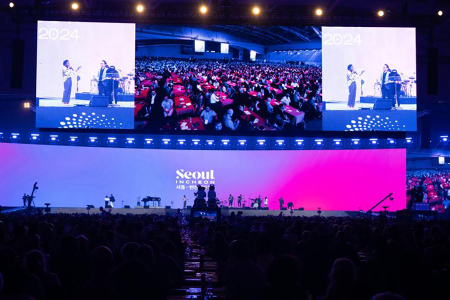Lausanne releases Seoul Statement: Here's what it says

INCHEON, South Korea — The Lausanne Movement released its Seoul Statement at the Fourth Global Congress on World Evangelism on Sunday. The document builds on the legacy of the Lausanne Covenant, the Manila Manifesto and the Cape Town Commitment and seeks to renew believers’ commitment to the centrality of the Gospel and the faithful reading of Scripture.
Unlike its predecessors that were published following the events, the statement is meant to inform and inspire participants’ deliberations throughout the gathering rather than summarize what was discussed, according to Program Director David Bennett.
Commenting to the press, Bennett emphasized that the purpose of the Seoul Statement is not to be a new stand-alone response to the missional challenges that the global Church is facing today.
Instead, it “stands as part of the larger collection of key documents within the Lausanne Movement, building on the legacy of the Lausanne Covenant, the Manila Manifesto and the Cape Town Commitment. It is designed not to replace, but to complement these foundational documents, providing fresh insights into contemporary theological and missional challenges.”
The statement also adds theological perspectives to the State of the Great Commission report that Lausanne released earlier this year, which identified 40 gaps in the Church’s pursuit of fulfilling the Great Commission of making disciples of all nations.
“Four years ago, we began a series of listening calls asking: What are the primary gaps that remain unfulfilled regarding the Great Commission? Where are some breakthroughs and innovations? Where is more collaboration and research needed? What voices need to be part of conversation?” Bennett said.
The result was the 500-page report that Lausanne released in April describing it as a document compiling the “best global data and key strategic thinkers to understand where the greatest gaps and opportunities are for the Great Commission’s fulfillment,” as Christian Daily International reported at the time.
Simultaneously, Lausanne’s Theology Working Group, a collective of global theological thinkers and practitioners, was working on addressing key theological gaps deemed necessary for strengthening global missions today, according to Bennett. The group was led by Co-Chairs Ivor Poobalan (Sri Lanka) and Victor Nakah (South Africa).
Statement laments failure of nurturing believers, training leaders
Acknowledging some positive developments alongside the expansive growth of the Church, primarily in Africa, Asia and Latin America, the statement’s preface highlights that the Great Commission is not only about sharing the good news of Jesus Christ, but also raise believers’ faith.
It laments that the Church “has struggled to effectively nurture the faith and discipleship of millions of first-generation Christians” and “not adequately provided the teaching necessary to help new believers develop a truly biblical worldview.”
The Church has not sufficiently prepared new believers to live out their faith in every aspect of life, whether they are at church, at home, at school or at work.
“It has also struggled to equip its leaders to respond to trending social values and to distortions of the gospel, which have threatened to erode the sincere faith of Christians and to destroy the unity and fellowship of the church of the Lord Jesus. Consequently, we are alarmed by the rise of false teachings and pseudo-Christian lifestyles, leading numerous believers away from the essential values of the gospel,” it says.
Affirming centrality of the Gospel, faithful reading of Scripture to meet today’s challenges
Building on the previous three key documents, the Seoul Statement seeks to renew believers’ commitment to the centrality of the Gospel and the faithful reading of Scripture. This will lay the firm foundation that will allow the global Church to meet the specific challenges it faces today, the preface concludes.
The main body of the 20-page statement features seven key themes that are broken down into sub-sections and ultimately 97 articles. The themes are:
I. The Gospel: The Story We Live and Tell
II. The Bible: The Holy Scriptures We Read and Obey
III. The Church: The People of God We Love and Build Up
IV. The Human Person: The Image of God Created and Restored
V. Discipleship: Our Calling to Holiness and Mission
VI. The Family of Nations: The Peoples in Conflicts We See and Serve for Peace
VII. Technology: The Accelerating Innovation We Discern and Steward
Participants are encouraged to study the statement and consider how various elements apply to the issues they seek to address as they join issue groups and collaborative afternoon sessions revolving around 25 of the 40 gaps, which the State of the Great Commission report identified.
Bennett leaves open whether or not there will be some form of summary of the conversations that take place throughout the week. But the statement’s conclusion already invites participants to join in expressing their desire to rectify some of the global Church’s shortcomings that have been revealed in recent years.
“We return to our places of service in every corner of the world with a renewed commitment to love as he has loved us, to lay aside selfish ambition, to work in gospel partnership, and to grow daily in prayerful dependence on his Spirit and the knowledge of his will, his ways, and his word,” it says in anticipation of the conclusion of the Congress.
This repentance and renewed determination to become more Christ-like in pursuing the fulfillment of the Great Commission is needed, “So that we may declare with one voice the excellencies of the One who alone is the hope and light of the world. So that we may display with one heart the holiness and love of the One who gave himself for sinners. So that we, the church, may declare and display Christ together!”
Originally published at Christian Daily International
Christian Daily International provides biblical, factual and personal news, stories and perspectives from every region, focusing on religious freedom, holistic mission and other issues relevant for the global Church today.





















